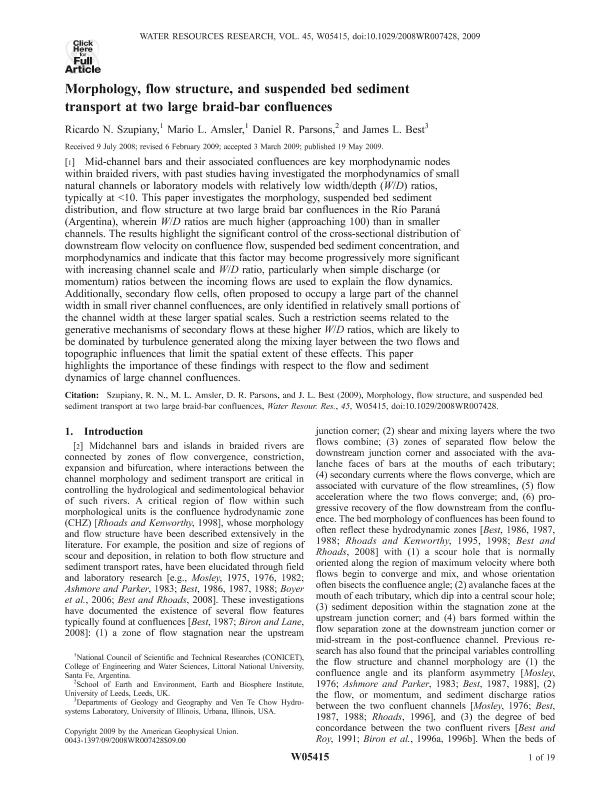Mostrar el registro sencillo del ítem
dc.contributor.author
Szupiany, Ricardo Nicolas

dc.contributor.author
Amsler, Mario Luis

dc.contributor.author
Parsons, Daniel R.

dc.contributor.author
Best, James L.

dc.date.available
2020-04-03T18:03:11Z
dc.date.issued
2009-05
dc.identifier.citation
Szupiany, Ricardo Nicolas; Amsler, Mario Luis; Parsons, Daniel R.; Best, James L.; Morphology, flow structure, and suspended bed sediment transport at two large braid-bar confluences; American Geophysical Union; Water Resources Research; 45; 15; 5-2009; 1-19
dc.identifier.issn
0043-1397
dc.identifier.uri
http://hdl.handle.net/11336/101914
dc.description.abstract
Mid-channel bars and their associated confluences are key morphodynamic nodes within braided rivers, with past studies having investigated the morphodynamics of small natural channels or laboratory models with relatively low width/depth (W/D) ratios, typically at <10. This paper investigates the morphology, suspended bed sediment distribution, and flow structure at two large braid bar confluences in the Río Parana (Argentina), wherein W/D ratios are much higher (approaching 100) than in smaller channels. The results highlight the significant control of the cross-sectional distribution of downstream flow velocity on confluence flow, suspended bed sediment concentration, and morphodynamics and indicate that this factor may become progressively more significant with increasing channel scale and W/D ratio, particularly when simple discharge (or momentum) ratios between the incoming flows are used to explain the flow dynamics. Additionally, secondary flow cells, often proposed to occupy a large part of the channel width in small river channel confluences, are only identified in relatively small portions of the channel width at these larger spatial scales. Such a restriction seems related to the generative mechanisms of secondary flows at these higher W/D ratios, which are likely to be dominated by turbulence generated along the mixing layer between the two flows and topographic influences that limit the spatial extent of these effects. This paper highlights the importance of these findings with respect to the flow and sediment dynamics of large channel confluences.
dc.format
application/pdf
dc.language.iso
eng
dc.publisher
American Geophysical Union

dc.rights
info:eu-repo/semantics/openAccess
dc.rights.uri
https://creativecommons.org/licenses/by-nc-sa/2.5/ar/
dc.subject
CONFLUENCES
dc.subject
LARGE RIVERS
dc.subject
FLOW STRUCTURE AND SUSPENDED BED SEDIMENT
dc.subject
SECONDARY CURRENTS
dc.subject
CHANNEL MORPHOLOGY
dc.subject
INTERACTIONS
dc.subject.classification
Oceanografía, Hidrología, Recursos Hídricos

dc.subject.classification
Ciencias de la Tierra y relacionadas con el Medio Ambiente

dc.subject.classification
CIENCIAS NATURALES Y EXACTAS

dc.title
Morphology, flow structure, and suspended bed sediment transport at two large braid-bar confluences
dc.type
info:eu-repo/semantics/article
dc.type
info:ar-repo/semantics/artículo
dc.type
info:eu-repo/semantics/publishedVersion
dc.date.updated
2020-04-02T13:22:52Z
dc.journal.volume
45
dc.journal.number
15
dc.journal.pagination
1-19
dc.journal.pais
Estados Unidos

dc.description.fil
Fil: Szupiany, Ricardo Nicolas. Universidad Nacional del Litoral. Facultad de Ingeniería y Ciencias Hídricas. Departamento de Hidráulica; Argentina
dc.description.fil
Fil: Amsler, Mario Luis. Consejo Nacional de Investigaciones Científicas y Técnicas. Centro Científico Tecnológico Conicet - Santa Fe. Instituto Nacional de Limnología. Universidad Nacional del Litoral. Instituto Nacional de Limnología; Argentina
dc.description.fil
Fil: Parsons, Daniel R.. University Of Leeds - School Of Earth And Environ.; Reino Unido
dc.description.fil
Fil: Best, James L.. University Of Illinois - Dept. Of Geology And Geography; Estados Unidos
dc.journal.title
Water Resources Research

dc.relation.alternativeid
info:eu-repo/semantics/altIdentifier/url/http://www.agu.org/pubs/crossref/2009/2008WR007428.shtml
dc.relation.alternativeid
info:eu-repo/semantics/altIdentifier/doi/http://dx.doi.org/10.1029/2008WR007428, 2009
Archivos asociados
